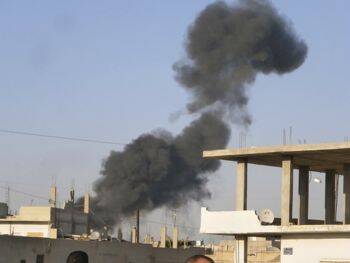As violence continued to shake Syria, the Vatican nuncio in Damascus called on the international community to unite in efforts to restore peace. "In Damascus, the last three days have been very difficult" as the fighting moved to the city, Archbishop Mario Zenari, the nuncio, said from the capital on July 17.
"The situation compared to a month ago clearly is more tense," he said. "The situation of the Christian community is the same as the situation for all Syrians. The Christians are not targeted, but they are under the same bombing and shelling the others face," the archbishop said.
An uprising against President Bashar Assad's government began in March 2011. Thousands of civilians have died in the fighting since then, and hundreds of thousands have been displaced. The U.N. refugee agency said July 17 that the number of Syrians seeking refuge outside the country has risen sharply in the past three months, with some 112,000 Syrian refugees now registered in Iraq, Jordan, Lebanon and Turkey.
Archbishop Zenari said, "The international community must speak with one voice; otherwise the parties involved in the conflict won't listen." The nuncio said he was not lobbying for any specific international intervention, but "too much time has already passed. There are many ways to reach a consensus."
Some Christian leaders in Syria have questioned the pro-democracy efforts to oust Assad, pointing out how religious liberty and the Christian communities have been protected under his leadership. "The future is difficult to foresee," the archbishop said. "Until now, there has been a good level of freedom of religion in Syria and good relations between Christians and Muslims. It could be difficult if that changed."
The nuncio said Christians, who make up about 8 percent of Syria's population, "are respected. They are not fanatics. They play a role of building bridges and live in peace with Muslims and Druze in the villages." While life is difficult for all Syrians, he said, the political tension and the fighting actually has drawn many communities closer together. For example, he said, the different Christian communities have struggled for years with the question of whether to celebrate Easter on the same day or follow their respective communities' calendars.
"But under the bombardments this year, they all agreed. Under the bombardments, they pray together. Christians and Muslims are helping one another," he said. Also July 17, Melkite Patriarch Gregoire III Laham of Damascus issued a statement saying that, thanks to their experience of peaceful coexistence, Syrians should be able "to resolve this dangerous crisis, helping one another through love and forgiveness."
"The greatest dangers in Syria today are anarchy, the lack of security and the massive influx of weapons from many places," he said in a statement.
The patriarch said there was "interference from foreign elements -- Arab and Western -- who bring weapons, money and one-sided information" into the country, inflaming passions on all sides and "weakening the voice of moderation." The Melkite leader claimed a campaign was being waged against Christian church leaders in the country, painting them as siding with the government.
"The church always has refused sectarianism, avoided taking sides and highlighted ethical and Gospel values," he said. "All the Catholic churches in Syria have raised their voices asking for reforms, freedom, democracy, an end to corruption, support for development and freedom of speech," he said. "Today we ask for an end to the cycle of killing and destruction, especially against civilians of all faiths who are in difficulty and are the real victims."








